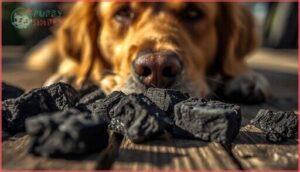This site is supported by our readers. We may earn a commission, at no cost to you, if you purchase through links.
The backyard barbecue was in full swing when Max, a curious Labrador, snatched a half-burnt charcoal briquette from the edge of the grill and swallowed it before anyone could react. His owner’s panic was immediate—and justified. While plain charcoal might seem harmless, like a piece of burnt wood, it poses genuine risks to your dog’s health, from stomach upset and choking to intestinal blockages that require emergency surgery.
Charcoal briquettes are even more dangerous, loaded with chemical additives like lighter fluid and petroleum-based binders that can cause serious toxicity. Whether your dog grabbed a chunk during cleanup or you’re wondering about activated charcoal as a home remedy, understanding the difference between various charcoal types and recognizing the warning signs of trouble can make all the difference in protecting your pet.
Table Of Contents
- Key Takeaways
- Can Dogs Eat Charcoal?
- Why is Charcoal Dangerous for Dogs?
- Symptoms of Charcoal Ingestion in Dogs
- What to Do if Your Dog Eats Charcoal
- When to Seek Veterinary Help
- Is Activated Charcoal Safe for Dogs?
- Preventing Charcoal Ingestion in Dogs
- Common Myths About Dogs and Charcoal
- Frequently Asked Questions (FAQs)
- Is normal charcoal good for dogs?
- Can you give human charcoal to dogs?
- How much charcoal do I give a dog?
- Why do people give dogs charcoal?
- Are certain dog breeds more vulnerable to charcoal?
- How long does charcoal stay in a dogs system?
- Can dogs develop a habit of eating charcoal?
- What alternative grilling methods are safer around dogs?
- Conclusion
Key Takeaways
- Dogs should never eat charcoal because plain charcoal can cause choking and stomach upset, while charcoal briquettes contain toxic additives like lighter fluid, petroleum-based binders, and accelerants that can lead to serious poisoning, intestinal blockages, and life-threatening emergencies requiring surgery.
- If your dog ingests charcoal, immediately remove them from the source, assess how much they consumed based on body weight (small dogs face higher risk at just 5+ grams), and contact your veterinarian or animal poison control right away—watch for warning signs like persistent vomiting, bloody diarrhea, severe abdominal swelling, difficulty breathing, or collapse that signal an emergency.
- Activated charcoal used by veterinarians is completely different from BBQ charcoal and works as a detoxification tool when dosed precisely by weight (1-4 grams per kilogram) to bind specific poisons, but you should never give human charcoal products to dogs without professional guidance because they contain additives that can worsen toxicity.
- Prevention is your best defense: store charcoal in secure metal or heavy-duty plastic containers on raised shelves, supervise dogs closely during BBQs by creating designated safe zones away from grills, properly dispose of cooled ash in double-bagged, lidded trash cans, and address chewing behaviors with durable toys and “leave it” training.
Can Dogs Eat Charcoal?
No, dogs shouldn’t eat charcoal. While plain charcoal from grills isn’t a recommended snack and can cause stomach upset or choking if swallowed in large pieces, small accidental amounts usually pass through the gut without long-term harm.
If your dog has a sensitive stomach like some do with foods such as kidney beans, even small amounts of charcoal could trigger digestive issues.
However, charcoal briquettes often contain additives like lighter fluid and toluene, which pose serious canine health risks and charcoal toxicity concerns. Don’t feed dogs charcoal-flavored treats either, as they may contain problematic ingredients.
If your dog consumes any significant amount, contact your veterinarian for guidance on monitoring and care. In cases of poisoning, it’s important to understand the correct activated charcoal dosage guidelines for dogs as advised by professionals.
Why is Charcoal Dangerous for Dogs?
While charcoal might seem harmless, it poses several real dangers to your dog’s health that you need to understand. The risks go beyond simple upset stomach, ranging from toxic chemical exposure to potentially life-threatening physical obstructions.
Let’s look at the three main reasons charcoal can be so hazardous for your canine companion.
Chemical Additives and Toxins
Briquettes often harbor toxic substances that pose significant risks beyond the charcoal itself. Many commercial varieties contain chemical additives like lighter fluids, accelerants, and binding agents that can trigger poisoning when your dog ingests them.
Here’s what makes these hazardous materials particularly dangerous:
- Petroleum-based accelerants cause chemical reactions that irritate the digestive tract
- Food contaminants and processing residues increase charcoal toxicity in dogs
- Heavy metals may migrate from packaging into the briquettes
- Synthetic binders release poisonous effects when broken down during digestion
- Toxic additives accumulate, intensifying toxicity with larger amounts consumed
Risks of Intestinal Blockage
Beyond those toxic additives, charcoal ingestion threatens your dog with serious gut obstruction. Large pieces can lodge in the digestive tract, creating intestinal blockages that trap contents and reduce blood flow, which leads to intestinal damage and potentially bowel perforation.
If untreated, abdominal infection develops as pressure builds, turning accidental ingestion into a life-threatening emergency requiring immediate intervention.
Untreated charcoal ingestion can cause abdominal infection and pressure buildup, escalating into a life-threatening emergency
Differences Between Charcoal Types
Not all charcoal poses equal danger to your dog’s digestive tract. Lump charcoal, made from irregular wood chunks, burns hotter and produces more ash, while briquettes contain binders and sometimes chemical accelerants that increase charcoal toxicity in dogs.
Coconut charcoal and binchotan burn cleaner with fewer additives, but ingesting any charcoal form still risks blockage and warrants immediate veterinary attention, especially when comparing:
- Natural lump charcoal versus additive-laden briquette types
- Chemical accelerants in quick-light varieties
- Coconut charcoal with lower smoke output
- Dense binchotan used in specialty grilling
Symptoms of Charcoal Ingestion in Dogs
If your dog gets into charcoal, you’ll want to know what signs to watch for so you can act quickly. The symptoms can range from mild digestive upset to more serious warning signals that need immediate veterinary attention.
Here’s what you might notice after charcoal ingestion, broken down by the most common reactions.
Your vet will track how well the treatment is working and may adjust the plan, especially if behavioral issues like leg biting complicate your dog’s recovery.
Vomiting and Diarrhea
When gastrointestinal issues strike after charcoal ingestion, vomiting often appears first—sometimes within hours, and it can be forceful or repeated as your dog’s stomach tries to reject the irritant.
Diarrhea usually follows as the digestive tract works to expel what it can’t process, ranging from loose stools to bloody output depending on how much charcoal passed through. These digestive problems signal that charcoal toxicity in dogs is affecting your pet’s digestive health and needs attention.
Abdominal Pain and Discomfort
One telltale sign of gastrointestinal issues is when your dog shows abdominal tenderness, flinching or whining when you touch their belly—an indicator that charcoal ingestion has irritated the digestive tract.
Stomach cramps and visible discomfort, like hunching or restlessness, point to deeper digestive problems that compromise intestinal health, making abdominal pain a serious charcoal ingestion symptom requiring veterinary assessment to avoid lasting pet health risks.
Lethargy and Loss of Appetite
When your dog’s spark fades—sleeping excessively, ignoring favorite toys, or refusing meals for over 12 hours—lethargy signs and appetite loss signal gastro issues from charcoal ingestion symptoms affecting the digestive tract.
Energy reduction combined with toxicity symptoms in dogs creates serious dog health risks, making pet monitoring essential to catch deteriorating conditions early and prevent life-threatening complications that demand immediate veterinary intervention.
What to Do if Your Dog Eats Charcoal
If your dog has eaten charcoal, staying calm and acting quickly can make all the difference in preventing serious complications.
The steps you take in the first few minutes matter, so knowing exactly what to do—and what not to do—will help you protect your pet while you get professional guidance. Here’s how to respond effectively when charcoal ingestion happens.
Remove Dog From Charcoal Source
The moment you notice your dog near a grill or bag of briquettes, act fast—charcoal removal tips start with preventing accidental ingestion from escalating. Pet safety measures depend on a quick emergency response:
- Move your dog to a clean area with access to fresh air and water
- Clear remaining charcoal pieces from the immediate environment
- Extinguish hot embers to prevent burns during charcoal storage relocation
- Remove lighter fluids and grill cleaners from reach
- Begin dog monitoring for charcoal ingestion symptoms like drooling or distress
If your dog begins to show any symptoms after possible charcoal exposure, you should be aware of the potential for gastrointestinal problems and blockage.
Assess The Amount Consumed
Estimating the charcoal quantity your dog consumed determines ingestion risks and guides veterinary guidance—check the grill, bag, or yard for what’s missing. For small dogs, even five grams of charcoal ingestion can pose toxic amounts risk, while larger breeds may tolerate twenty grams before serious consumption effects appear. Record the time of accidental ingestion and any additives present, as charcoal dosage relative to body weight influences activated charcoal treatment decisions and potential toxicity outcomes.
| Dog Size | Trace to Small Amount | Moderate to Large Amount |
|---|---|---|
| Small (under 20 lbs) | Under 5 grams—monitor closely | 5+ grams—call vet immediately |
| Medium (20-50 lbs) | Under 10 grams—watch for symptoms | 10+ grams—seek urgent care |
| Large (50-90 lbs) | Under 20 grams—observe behavior | 20+ grams—emergency evaluation |
| Giant (90+ lbs) | Under 30 grams—monitor hydration | 30+ grams—veterinary assessment |
| All Sizes | Document time and source | Note additives or lighter fluid |
Immediate First Aid Steps
After charcoal ingestion, your emergency response starts with checking the scene for safety before gently moving your dog away for charcoal removal. Call your veterinarian or animal poison control immediately for veterinary guidance on this veterinary emergency care situation.
Offer small amounts of water if your dog can swallow, and monitor breathing changes—first aid tips that support dog health while awaiting professional pet safety instructions regarding activated charcoal toxicity.
When to Seek Veterinary Help
Not every instance of charcoal ingestion requires a trip to the vet, but knowing when to act quickly can make all the difference in your dog’s outcome.
Some situations demand immediate intervention, while others may resolve with careful home monitoring and supportive care. Understanding the warning signs, what to expect during veterinary treatment, and how recovery usually unfolds will help you make informed decisions when your dog’s health is on the line.
Warning Signs of Emergency
Certain symptoms signal that your dog’s charcoal ingestion has escalated beyond a simple stomach upset, and recognizing these red flags can mean the difference between a routine vet visit and a life-threatening emergency.
If your dog shows persistent vomiting, bloody diarrhea, severe abdominal swelling, difficulty breathing, or collapse, you’re dealing with toxic reactions requiring critical care—don’t wait, contact emergency veterinary care or poison control immediately.
How Vets Diagnose and Treat
Once you arrive for emergency veterinary care, your vet begins with a thorough physical exam, checking basic signs, hydration status, and abdominal palpation to detect gastrointestinal obstruction from toxic substance ingestion.
Depending on findings, they’ll recommend:
- Blood tests to assess organ function and systemic effects of animal poisoning
- X-rays or imaging scans to locate charcoal fragments causing blockages
- Induced vomiting if ingestion was recent and safe to perform
- Activated charcoal administration to bind remaining toxins in the digestive tract
Your vet then develops an individualized treatment plan combining medications, fluid therapy, and monitoring to support recovery.
Possible Outcomes and Recovery
With prompt Veterinary Intervention, most dogs recover fully within 24 to 72 hours as Gastrointestinal Healing progresses and vomiting subsides.
Your Recovery Timeline depends on whether Intestinal Blockages occurred, your dog’s size, and the Toxicity level of ingested materials. Post-Ingestion Care involving restricted activity, small frequent meals, and hydration support helps Dog Digestive Health return to normal, with Full Recovery Signs like restored appetite usually appearing within 1 to 3 days after Emergency Veterinary Services begin treatment.
Is Activated Charcoal Safe for Dogs?
You might’ve heard about activated charcoal as a treatment at the vet clinic, and it’s natural to wonder if it’s the same as the charcoal briquettes in your backyard.
The short answer is no, they’re completely different substances with different safety profiles for your dog. Here’s what you need to know about how activated charcoal works, when vets actually use it, and what risks come with it.
Activated Charcoal Vs. Regular Charcoal
These two forms of charcoal aren’t the same thing. Regular charcoal, like BBQ briquettes, is simply carbonized wood, often with harmful additives that increase toxicity for your dog’s digestive health.
Activated charcoal undergoes an activation process that creates massive surface area—up to 1500 square meters per gram—giving it impressive adsorption power. That’s why medical and filtration uses require activated charcoal, while regular charcoal poses real risks requiring veterinary care.
Veterinary Uses and Dosage
Vets use activated charcoal primarily for detoxification when your dog ingests certain toxins, with dose calculation based strictly on body weight—usually 1-4 grams per kilogram. Administration routes include oral slurry mixed with water, though your vet determines timing and frequency based on the specific poison involved.
- Monitoring treatment involves tracking your dog’s hydration status and gastrointestinal function throughout the detoxification process
- Drug interactions matter because activated charcoal can bind medications, reducing their effectiveness during veterinary care
- Adverse effects like constipation or black stools are common, requiring professional oversight rather than home treatment after charcoal ingestion
Potential Side Effects
Understanding the downside of treatment helps you prepare for what may follow therapeutic charcoal ingestion. Your dog might experience reduced absorption of essential nutrients, gas bloating, or black stools that persist for days after administration, while aspiration pneumonia remains a rare but serious risk if vomiting occurs during treatment.
| Common Side Effect | What to Monitor |
|---|---|
| Reduced Absorption | Medication effectiveness, nutrient uptake during recovery |
| Gas Bloating | Abdominal distension, discomfort signs, appetite changes |
| Electrolyte Shifts | Weakness, muscle tremors, dehydration indicators |
Toxic additives in non-medical charcoal products increase toxicity symptoms in dogs, threatening canine gastrointestinal health beyond what activated charcoal alone might cause, which is why veterinary-grade formulations matter during poisoning emergencies.
Preventing Charcoal Ingestion in Dogs
The good news is that most charcoal-related incidents are completely preventable with a few simple precautions.
By taking proactive steps to limit your dog’s access to charcoal and managing their environment during high-risk situations, you can greatly reduce the chances of accidental ingestion.
Let’s look at three practical strategies that can help keep your dog safe.
Safe Storage and Disposal
The best defense against charcoal ingestion starts before your dog gets anywhere near it—think of safe storage and proper disposal as your first line of pet poisoning prevention. Here’s how to eliminate the risk entirely:
- Secure Containers: Store charcoal in hard-sided metal or heavy-duty plastic bins with tight-fitting lids, never in thin bags dogs can tear.
- Location Safety: Keep bins on raised shelves in garages or sheds, away from dog food or play areas.
- Ash Handling: Let used charcoal cool completely for 24 hours in a closed grill or metal container before moving.
- Proper Disposal: Double-bag cooled ash and place it deep inside lidded trash cans where dogs can’t reach.
- Fluid Storage: Lock lighter fluid in its original child-resistant container on high shelves, as toxic additives pose serious risks.
These pet safety precautions protect your dog from both unused charcoal and dangerous residues.
Supervision During BBQs and Outdoors
BBQ season transforms your backyard into a minefield of temptations for curious dogs, making constant supervision your most powerful tool against charcoal consumption.
Designate safe zones away from grills where your dog can relax on a leash or behind a barrier, handling distractions with toys or treats.
These BBQ pet safety tips prevent accidental ingestion while you’re focused on cooking or entertaining guests.
Addressing Chewing Behaviors
Dogs that chew inappropriate items like charcoal often need redirected jaw stimulation and environmental enrichment to break the habit. Offer durable chew toys sized for your dog’s strength, rotating them weekly for boredom prevention.
Address oral fixation through puzzle feeders and interactive games that occupy curious mouths. Consistent training with “leave it” commands strengthens pet owner responsibility, reducing accidental ingestion while you’re managing eating charcoal risks outdoors.
Common Myths About Dogs and Charcoal
In the context of charcoal and dogs, misinformation spreads quickly, often leading well-meaning pet owners down dangerous paths.
You might hear that charcoal can cleanse your dog’s system or that home remedies are just as effective as professional care, but these beliefs can put your pet at serious risk.
Let’s clear up some of the most common misconceptions so you can make informed decisions about your dog’s health.
Misconceptions About Detox Benefits
Some pet owners believe charcoal works like a magic detox for dogs, but this misses the mark entirely. Here’s what you need to know about these detox myths:
- Weight Loss Myth: Charcoal doesn’t burn fat in dogs eating charcoal accidentally—any weight change reflects water loss, not actual detoxification
- Toxin Purge Fallacy: Your dog’s liver and kidneys already handle toxin removal without activated charcoal supplements
- Nutrient Deficiency: Charcoal binds to nutrients, potentially causing deficiencies rather than health benefits
- Poisoning Risk: Without veterinary advice, home charcoal treatments can worsen activated charcoal poisoning situations
Myths About Natural Remedies
Many owners assume natural remedies lack risks, but herbal safety isn’t guaranteed just because something grows in nature. Activated charcoal falls into this trap—regulation loopholes mean dosing varies wildly, and efficacy gaps exist between detox claims and actual science. Without your veterinarian’s oversight, you’re gambling with toxic materials that can cause poisoning rather than healing your pup.
| Natural Pet Care Myth | Reality Check |
|---|---|
| “Plant-based means harmless” | Can interact with medications or cause organ stress |
| “More natural = safer dose” | Wrong amounts trigger serious side effects |
| “Works for humans = works for dogs” | Species differences make treatments dangerous |
Risks of Home Treatment Without Vet Guidance
Skipping vet guidance sets you up for medical errors that can turn a manageable situation into a life-threatening emergency. Home remedies bypass the diagnostic precision needed for toxic substance ingestion, and without proper veterinary care, you risk:
- Misdiagnosing symptoms while the real problem worsens
- Administering harmful doses or contraindicated treatments
- Missing internal blockages that require surgical intervention
- Delaying emergency response when every minute counts
For accidental ingestion, contact your vet or the Pet Poison Helpline immediately—pet safety depends on professional assessment, not guesswork.
Frequently Asked Questions (FAQs)
Is normal charcoal good for dogs?
No, regular charcoal offers zero nutritional benefit to your dog and actually poses serious choking risks.
It also poses digestive obstruction and toxicity risks—especially barbecue briquettes containing lighter fluid, binders, or other harmful chemical additives pets shouldn’t ingest.
Can you give human charcoal to dogs?
You shouldn’t give human charcoal to dogs without vet guidance—products formulated for people often contain binding agents, flavors, or additives that irritate your dog’s digestive tract and increase toxicity symptoms beyond the charcoal itself.
How much charcoal do I give a dog?
You shouldn’t give your dog charcoal without vet approval—dosage depends on weight-based dosing and toxin-specific amount.
Only veterinary care professionals can determine the safe, effective dose for your dog’s situation.
Why do people give dogs charcoal?
Veterinarians use activated charcoal as a toxin removal tool when dogs ingest certain poisons, helping trap chemicals in the digestive tract before absorption occurs.
Charcoal therapy requires veterinary guidance and proper dosing for safe, effective animal health outcomes.
Are certain dog breeds more vulnerable to charcoal?
While charcoal toxicity isn’t tied to canine genetics directly, smaller breeds face higher risks from intestinal blockage due to narrower digestive tracts, and brachycephalic dogs may struggle more with breathing difficulties after ingestion.
How long does charcoal stay in a dogs system?
Most charcoal passes through your dog’s digestive system within 24 to 72 hours, depending on the amount consumed and your dog’s size, though intestinal blockages can delay or prevent complete elimination.
Can dogs develop a habit of eating charcoal?
Like a moth drawn to flame, some dogs can develop a persistent habit of eating charcoal through pica behavior or repeated access, turning curiosity into a troublesome pattern that requires environmental management and behavioral intervention.
What alternative grilling methods are safer around dogs?
You’ll find that electric grilling, smokeless BBQ setups, and outdoor ovens offer the safest pet-friendly grills, eliminating charcoal briquettes and lighter fluid while maintaining excellent grilling safety and indoor grilling convenience around curious dogs.
Conclusion
You might’ve heard that charcoal “detoxifies” everything it touches, but when your dog grabs a charcoal briquette from the grill, that myth doesn’t hold up against chemical burns and intestinal blockages.
The truth is, dogs can’t eat charcoal safely—not the backyard kind, anyway. Immediate veterinary attention, careful supervision during cookouts, and secure disposal are your best defenses.
When in doubt, trust your instincts and call your vet. Your dog’s safety depends on it.
- https://www.aspca.org/pet-care/animal-poison-control
- https://www.petpoisonhelpline.com/
- https://pangovet.com/?utm_source=dogster&utm_medium=article&utm_campaign=dog_eat_drink&utm_content=dog-ate-charcoal
- http://vspn.org/library/misc/VSPN_M01158.htm
- https://www.merckvetmanual.com/special-pet-topics/poisoning/nitrate-and-nitrite-poisoning
















